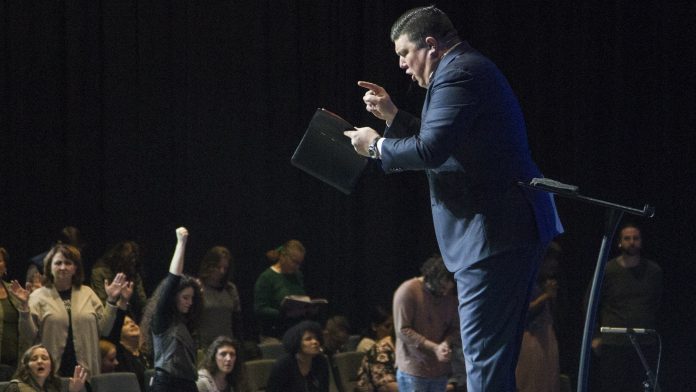As multiple governors issue orders to curb large gatherings and implore residents to stay home in a bid to slow the spread of the coronavirus, at least a half-dozen states have exempted some level of religious activity.
The divergent treatment of faith in some states’ pandemic-fighting orders comes as a few houses of worship across the nation continue to greet people in person, despite federal public health guidance to avoid gatherings larger than 10 people and decisions by most religious leaders to shift services online. While the pandemic has heightened political tensions, the states including religious exceptions in their orders designed to combat the pandemic are led by governors in both parties.
In Michigan, for instance, Democratic Gov. Gretchen Whitmer announced a stay-at-home order on Monday that banned all gatherings outside of individual households. Guidance on the order noted that “a place of religious worship, when used for religious worship, is not subject to penalty” for violating it, a standard that the state had applied to its previous order curbing gatherings.
In Tennessee, where Republican Gov. Bill Lee issued a Sunday order limiting gatherings to 10 people, Pastor Greg Locke said he plans to keep having service at Global Vision Bible Church in Mt. Juliet. Locke said that he plans to be in touch with attorneys about remaining open, and that he is providing essential services to locals still recovering from tornadoes that slammed the state earlier this month.
“I don’t think a church staying open in days of chaos, when people need hope—I don’t think that should be controversial,” said Locke, describing himself as “shocked” by the degree of public pushback he received for continuing to hold services.
Religious gatherings were exempted from Ohio’s stay-at-home order, issued Sunday by Republican Gov. Mike DeWine. Solid Rock, an Ohio megachurch whose Cincinnati location hosted an event for evangelical supporters of President Donald Trump last month, held an in-person service on Sunday and said on its website that it would exert a constitutional right to continue meeting.
“We do believe that it is important for our doors to remain open for whomever to come to worship and pray during this time of great challenge in our country,” the church stated, noting that it wants to “help keep people safe.”
DeWine posted a Sunday warning on his Twitter account, asking “religious leaders to think about their congregations” as they weigh state guidelines crafted for public health reasons.
“We did not order religious organizations to close, but my message to EVERYONE is that this is serious. When you are coming together, whether in a church or wherever – this is dangerous,” DeWine tweeted.
Another pastor who took heat for holding in-person service on Sunday, Tom Walters of Pennsylvania’s Word of Life Church, posted an apology on the church’s Facebook page and said he would move to online-only worship amid the virus.
“Please believe me when I say that it was not out of arrogance or defiance” that the church met, Walters wrote, “but solely for the purpose of praying for our churches, communities, and nation.”
Other states declining to force closures of places of worship include Pennsylvania, where the list of essential businesses permitted to keep operating includes “religious organizations,” and New York, where all nonessential businesses across the state were ordered closed as of Sunday night. Guidance accompanying that order said that “houses of worship are not ordered closed,” but “it is strongly recommended no congregate services be held and social distance maintained.”
Tony Suarez, executive vice president of the National Hispanic Christian Leadership Conference and a member of President Donald Trump’s evangelical advisory board during the 2016 campaign, tweeted on Tuesday that he was “thankful” to see the number of states “listing churches as ‘essential services’.”
States that did not exempt religious activity in their pandemic-related shutdown orders include Oregon, whose Democratic governor moved to prohibit nonessential gatherings on Monday, and Maryland, whose Republican governor’s list of activities limited to 10 people on Monday included the “spiritual (and) religious.”
California’s stay-at-home order, by contrast, classified ”faith based services that are provided through streaming or other technology” as an essential function.
All Content & Images are provided by the acknowledged source
